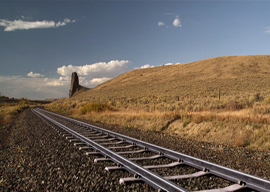
April 27, 2011

With the price of gasoline at $37.50 per gallon, air travel is practically extinct, making the economy once again dependent upon railroads. Oilman Ellis Wyatt has discovered a vast new field in Colorado, but he has to ship his oil to market via railroad, the pipeline apparently having been disinvented.
Today, oil and rail don”t seem to go together any more naturally than oil and water. Yet many in Rand’s 1957 audience would have remembered the vast controversy ignited by muckraker Ida M. Tarbell’s 1904 The History of the Standard Oil Company, which revealed that John D. Rockefeller’s monopoly forced railroads to pay Standard a “drawback” on every barrel of competitors” oil they transported. (In 2007’s There Will Be Blood, the cozy arrangement between Rockefeller and the railroads drives Daniel Day-Lewis’s ornery oilman to build his own pipeline over the mountains.)
Wyatt is dependent upon America’s last privately owned railroad, Taggart Transcontinental, run by feckless scion James and his dynamic sister Dagny. Poor Wyatt’s oil shipments routinely derail because Taggart’s rails haven”t been upgraded in a century. James assumes that’s not his problem because he’s well-connected in Washington. Dagny, however, bets the company by giving a huge contract for laying new tracks to Hank Rearden, the handsome inventor of Rearden Metal, a sort of proto-titanium.
The steel companies mount a scare campaign to ban Rearden’s unwelcome competition, but Dagny and Hank demonstrate Rearden Metal’s reliability by zooming across their new 955-foot-high Royal Gorge Bridge. Soon, the triumphant twosome are personally laying pipe.
Then some more stuff happens, but Part I wraps up in a painless 97 minutes, with most of Rand’s rants left out.
Rand is famous for being anti-government, so it’s intriguing to see how much she despised corporate oligarchs equipped merely with deft lobbyists. The obvious analogy to the Wall Streeters whom the feds bailed out in 2008 may account for the renewed popularity of Rand’s book in this Tea Party era, but terribly few politicians have yet dared to take on crony capitalism.